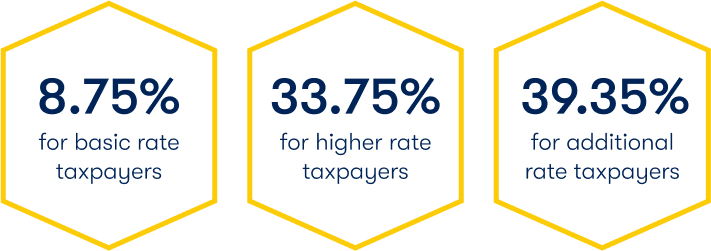
One way of owning rental property is through a limited company. Mortgage lenders often refer to this option as a Special Purpose Vehicle (SPV) as lenders insist that the limited company is used solely for the purpose of owning rental property.
The benefits of owning rental property in a limited company
Let us consider the case of Mark and Cleo.
They are aged 37 and 33 respectively, married with no children and no plans to start a family.
Mark is a software programmer and Cleo is a Headteacher. They are both higher rate taxpayers paying Income Tax at 40%.
Tax rates
If they chose to own a rental property in their personal names any rental profits would be taxed at 40% and potentially 45% (if Mark or Cleo has taxable income in excess of £125,140). If either Mark’s or Cleo’s adjusted net income exceeds £100,000, their personal allowance of £12,570 would be reduced by £1 for every £2 it exceeds £100,000. Therefore, an individual with adjusted net income over £125,140 loses their entitlement to the personal allowance entirely.
If Mark and Cleo decided to use a limited company to hold their rental property, any rental profits will be taxed at Corporation Tax rates which are: -
On profits up to £50,000, the Corporation Tax rate is 19% and this is known as the small profits rate.
On profits between £50,000 and £250,000 the corporation tax main rate of 25% will apply but Marginal Relief will be given. Marginal Relief provides a gradual increase in the corporation tax rate between the small profits rate of 19% and the main rate of 25%.
If profits exceed £250,000, a corporation tax rate of 25% will apply to all of the profits.
By owning rental property in a limited company, Mark and Cleo’s effective tax rate could be as low as 19% compared with an unavoidable tax rate of 40% if ownership is in their personal names.
Mortgage interest
In their personal names, any interest payments on a mortgage taken out to buy the rental property would be restricted to 20% tax relief.
For example, if they paid interest in a tax year of say £1,000, this would generate only £200 in tax relief.
Prior to April 2017, Mark and Cleo would have received tax relief on their mortgage interest payments at their marginal rate of tax i.e. 40%. So based upon £1,000 mortgage interest paid, they would have benefited from £400 tax relief rather than the current £200.
In a limited company, the mortgage interest on a rental property is fully allowable as a direct cost against rental income. Limited companies can claim this deduction much like landlords could before April 2017. For example, if Mark and Cleo have £1,000 in mortgage interest on their rental property, they can deduct that amount from their rental income to arrive at the taxable profit.
Extracting profits from a limited company
As shareholders and directors of a limited company, Mark and Cleo might want to extract the company's profits for personal use. There are a number of ways they can do this:
Dividends
Dividends can be paid to the shareholders of a company from post-tax profits. There is an annual tax-free dividend allowance of £500 per person, so between them, Mark and Cleo could pay themselves £1000 in dividends completely tax free. The tax rate on dividends is then:



Salary
In Mark and Cleo’s case, it would not be tax efficient to pay either of them a salary for any duties they carry out on behalf of the limited company. They already have income from their employments so paying them a salary from the company would be taxed at 40% in their personal name. The tax relief they would get in the company would be 19% and at most 25% so it does not make sense to pay a salary.
If either of them had no income, then the situation would be different. In that case it may be worthwhile paying a salary, but care should be taken that the amount paid is reflective of the duties and work actually carried out to avoid a challenge from HMRC.

Other tax savings
There are a number of other ways in which Mark and Cleo can extract income from the company in a tax efficient way. By setting up a limited company, Mark and Cleo can now start to maximise their directors’ benefits which include the following:

Trivial benefits worth up to £300 each per annum

Annual company events

Mobile phone

Working from home

Mileage

Interest on their directors’ loan account

Company cars
Company structure
Simple limited company
If you are a single sole investor, then a straightforward limited company with just yourself as the sole director and shareholder is sufficient. A company can be set up fairly quickly using Model Articles at a relatively low cost. One drawback with this set up however is that it can present difficulties if the sole director passes away. No one would be able to immediately take control of the company and it could be several months before a relative could obtain probate and clearance to act on behalf of the company.
Limited company with Alphabet shares
In Mark and Cleo’s case a simple company with just ordinary shares would not be the most tax efficient way to set up the company. Instead, they should consider setting up the company with two class of shares, A and B, referred to as Alphabet shares.
A typical structure would look like this: -
Mark – 50 Ordinary A shares
Cleo – 50 Ordinary B shares
Both share classes have equal rights to voting, dividend and capital.
The advantage of this structure is that it provides them with flexibility in voting dividends and reduces complexity where one of the directors dies. If one of Mark and Cleo reduces their hours and becomes a basic rate taxpayer, more dividends can be allocated to their class of share to take advantage of the basic tax rate for dividends of 8.75%, as opposed to the higher tax rate of 33.75%.
Reporting requirements
Limited Companies are liable to pay Corporation Tax, therefore Mark and Cleo, as directors, are required to do the following each year:
- Submit accounts to Companies House within 9 months of their year-end.
- Make payment of any Corporation Tax due within 9 months and 1 day of their year-end.
- Submit the company tax return (CT600) to HMRC within 12 months of the year-end.
- Submit a Confirmation statement annually to Companies House confirm the directors and shareholders of the company.









